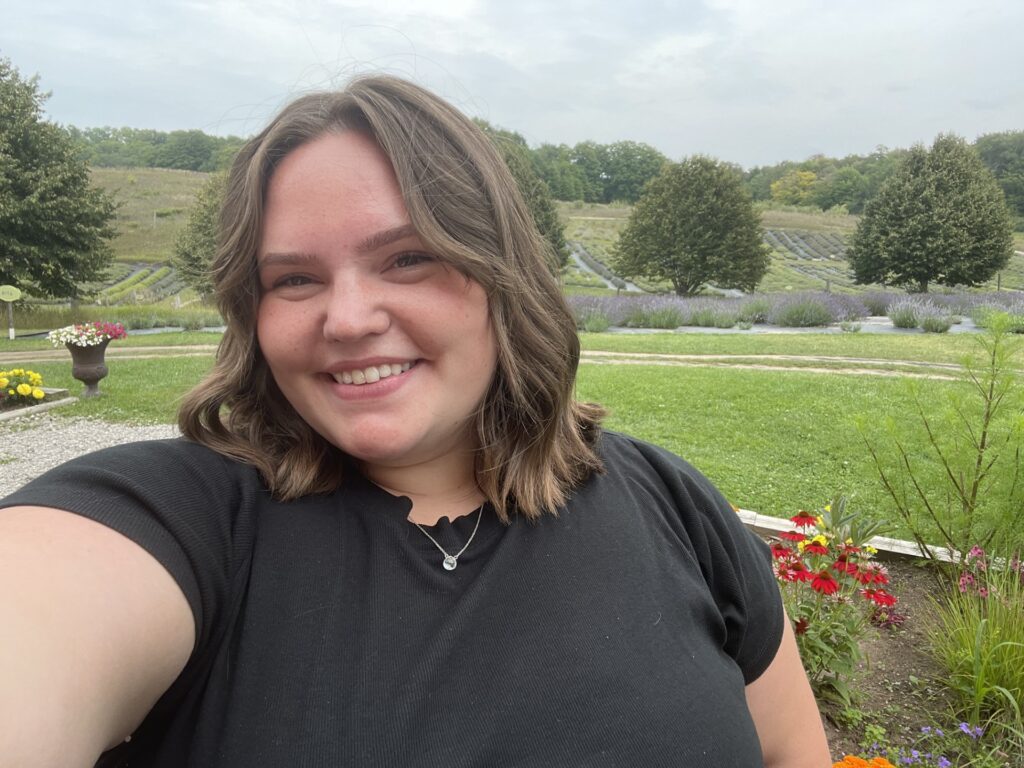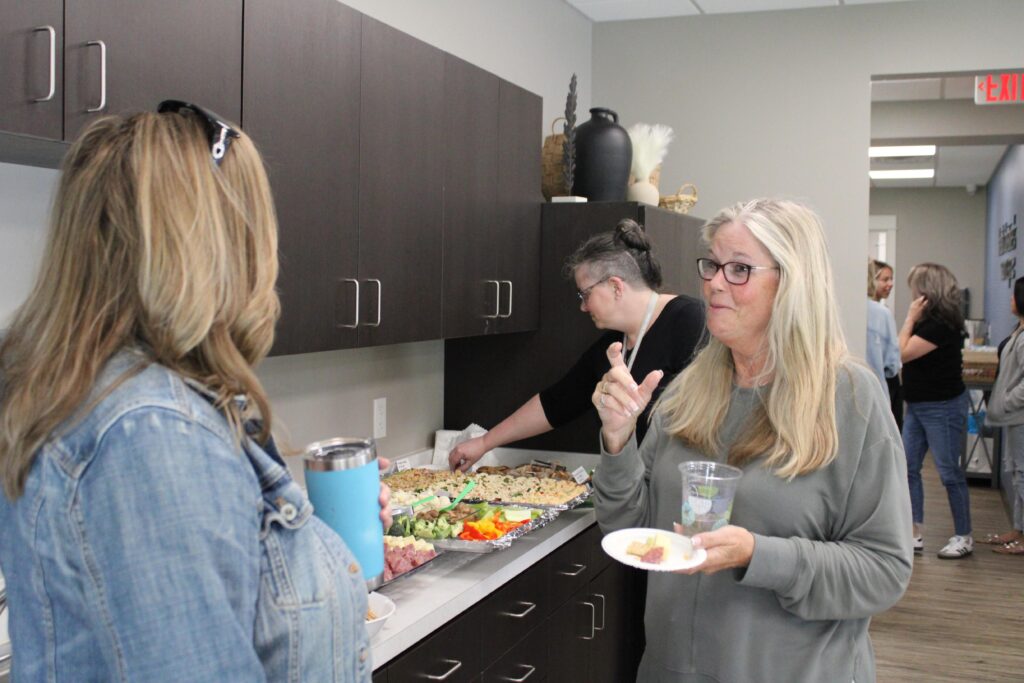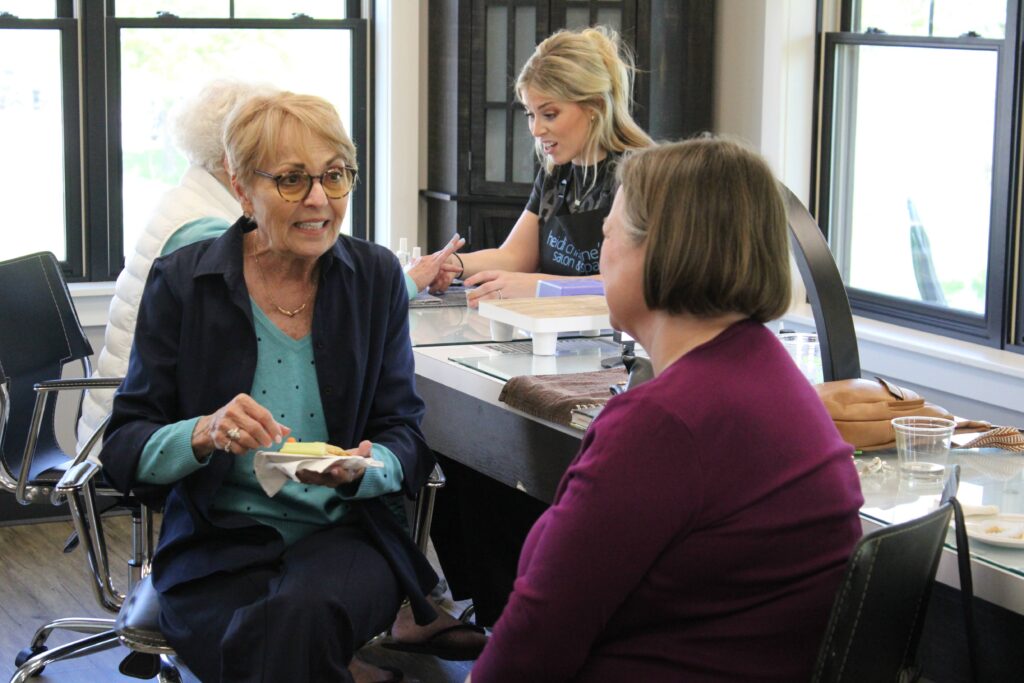Interpreter Spotlights
Haley Shorkey
What drew you to the profession?
I had wanted to learn ASL for a long time. When I started at my first community college, my best friend and I decided to take a class together. I fell in love with it. I was also lucky enough to have a Deaf professor. He really took me under his wing and encouraged me to think about interpreting. From there, I ended up at LCC and in their Interpreter Training Program (ITP) and I learned all that this profession has to offer! I fell in love even more, graduated, and went on to get certified.

What keeps you doing it?
First and foremost, the people that I work with. Deaf people are amazing and one of the overlooked groups in our society. The stigma and stereotype of deafness is still very much real today, but those of us in the community know that stereotype is so far from true. Deaf people are some of the kindest, funniest, most generous, and most intelligent people I know. Being able to not only get to know them, but provide access is one of the greatest joys of my life. I also have some amazing colleagues! Being able to work with some incredibly talented interpreters who also care so much about this profession and all the folks involved is another great joy of my life!
Perks of the profession?
I never have wanted to be a person who sits in a cubicle all day, and being a freelance interpreter allows me to do a variety of different things. I have gotten to be a part of weddings, family parties, so many graduations(which are some of my favorites!), college classes, gotten to see the ins and outs of a lot of different professions and so many other cool things that a normal person wouldn’t get to do. It’s really exciting and constantly keeps me on my toes. Plus I am constantly learning so much about the world around me.
What do you wish people knew about the work you do?
There are a few things that I wish people knew. First, not to underestimate the Deaf community. I don’t think that needs much explanation. Deaf people are amazing and are the reason any of us are here. They need just as much recognition. Second, I wish they knew how difficult our job was. As interpreters, we have to go through lots of specialized training, take state certification tests, and constantly be the link between two different languages and cultures. Interpreting is not easy, and it is both mentally and physically exhausting at times. While everyone can learn ASL, not everyone can be an interpreter.
How long have you been connected to D&HHS?
I have worked for DHHS since I got certified, so about two years. DHHS has an amazing staff that cares about each other as well as their interpreters. Access and advocacy are their main goals, and they really do a great job at accomplishing both. I am so grateful to work for such an amazing agency. The staff at DHHS work so hard and I love being part of an organization that cares so deeply for all the people involved.
Lisa Cook
What drew you to the profession?
I met a Deaf mom when I was 9 years old, she was my new neighbor. Seeing her sign with her 2-year-old & 5-year-old children just fascinated me. We became friends, I babysat for her kids and she started teaching me sign language. I knew very young that I would make a career of using sign and working with the Deaf and Hard of Hearing communities.

I started interpreting at the beginning of my teaching career, paused as my family grew, and then started interpreting again after I retired. It’s been about 18 years all together. I loved teaching Deaf and Hard of Hearing students and had always planned to transition into medical/mental health interpreting once I retired.
What keeps you doing it?
I keep interpreting because I have a passion for learning, particularly in the area of medicine, I enjoy expanding my sign language vocabulary/skills. I love providing access to communication within the medical and mental health field. I can’t imagine my life without our Deaf and Hard of Hearing community. I love the language and the people and will continue to interpret as long as my mind/hands allow.
Perks of the profession?
The interpreting profession allows me flexibility to work, travel and still make family a priority. Unlike teaching, I now make my own schedule. I also feel blessed to be able to interpret for members of the Deaf and Hard of Hearing community who were my students many years ago – reconnecting in a new way and a new role. Lastly, it’s a huge perk being employed by such a caring/attentive agency while working with a diverse community of clients and interpreters.
What do you wish people knew about the work you do?
Often people come up and say, “I’ve always wanted to learn sign. If I took a couple classes could I do what you do? It looks so cool!” So I wish people realized how much time and effort goes into the profession of interpreting. Years of studying Deaf culture, ASL grammar, the nuances and differences between PSE, SEE, and ASL and testing, testing, testing (both written and performance) are required to be employed as an interpreter.
How long have you been connected to D&HHS?
I’ve been connected to D&HHS for over 20 years. First as an educator, then as an ASL instructor and now as an Interpreter. I appreciate that D&HHS is an agency specifically for the Deaf, DeafBlind, and Hard of Hearing communities, providing equipment, workshops (for the Deaf as well as Interpreters), social events, interpreting services, advocating services, and educational resources. Many of my clients and their families have benefitted from these options. I feel very blessed to be connected to D&HHS, I believe the staff genuinely cares about the community they serve as well as the interpreters they employ.
Marilyn Corlett
What drew you to the profession?
I was blessed with Deaf parents. The only thing they couldn’t do was hear. My Mom and Dad put God first. As a result, their lives reflected their love for each other, their five children, and the Deaf community. My parents’ deafness did not prevent them from fully participating in our lives. I still have the written communication from parent/teacher conferences that my mom attended. I remember too as a little girl pointing out the words in the hymnal so my mom could follow along when the service wasn’t interpreted. Our

parents gave us language for which I am eternally grateful. Oftentimes my oldest brother would interpret in certain situations, and I wanted to grow up to be like him. Relying on family members to interpret is highly discouraged and rightfully so. However, I grew up in a time when interpreters were scarce. Our parents were wise and extremely independent. We never felt burdened on those rare occasions that we interpreted for them. In truth, I believe it gave me additional insight into our profession.
What keeps you doing it?
Previous generations of my hearing relatives were committed to the Deaf community and more specifically to the education of Deaf children. All this left me with a rich legacy and encouragement to pursue my career as an interpreter. Our family passed on pride and love for their language and for Deaf people that I cherish. I must admit though that my Dad asked where his commission was! If not for him and his investment in me, I would have never pursued this field. I owe my parents big time!
Perks of the profession?
I am grateful to the Deaf community for the opportunity to identify with them. I’m thankful for their patience and willingness to engage and help me develop as an interpreter. More importantly, the opportunity to establish relationships with wonderful people who have been a major influence in my life. And I’m grateful for Deaf and hearing interpreters who have been amazing role models and encouraged me in my work. Providing a service, connecting voices and hands, and seeing communication take place is a privilege.
How long have you been connected to D&HHS?
I’ve been working with DHHS for over 10 years. I appreciate the fact that DHHS is truly invested in the Deaf, Hard of Hearing and DeafBlind community. The hard work of staff and their contribution to our community is immeasurable. The coordinators advocate for appropriate services and are well acquainted with so many of our consumers. They also know our strengths and weaknesses as interpreters. As a result, they do their very best to meet the consumers’ communication needs in meeting their requests. I can’t say enough about the work they do behind the scenes to make sure effective communication is taking place. I have learned in my career to expect the unexpected. These coordinators “have our backs” and are quick to respond in emergency situations. I often wonder if they ever sleep because they’re on call, 24/7. They are truly Rock Stars.
